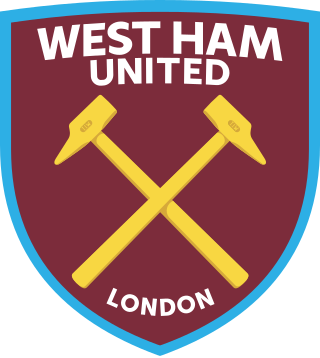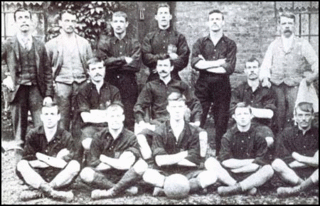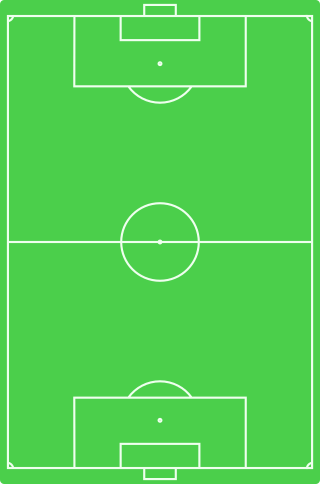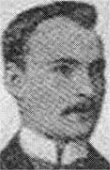Related Research Articles

West Ham United Football Club is an English professional football club that plays its home matches in Stratford, East London. The club competes in the Premier League, the top tier of English football. The club plays at the London Stadium, having moved from their former home, the Boleyn Ground, in 2016.

The Thames Ironworks and Shipbuilding Company, Limited was a shipyard and iron works straddling the mouth of Bow Creek at its confluence with the River Thames, at Leamouth Wharf on the west side and at Canning Town on the east side. Its main activity was shipbuilding, but it also diversified into civil engineering, marine engines, cranes, electrical engineering and motor cars.

The 1895–96 season was the inaugural season of Thames Ironworks, the club that would later become West Ham United. The club was founded by Dave Taylor and Arnold Hills in 1895 as the works team of the Thames Ironworks and Shipbuilding Company. Taylor was a foreman at the Ironworks and a local football referee. Thanks to Ironworks owner Arnold Hills' financial backing, he was able to announce on 29 June 1895 the following in the company's weekly journal:
David Furnell was an English footballer who played as a goalkeeper.

The 1896–97 season was Thames Ironworks' second season after the club's formation in 1895.
Edward Hatton, also known as E. G. Hatton, was a footballer who played centre forward for Reading F.C. and Thames Ironworks, the team that eventually became West Ham United. He joined Thames Ironworks in 1896, scoring a brace on his debut in a 3–1 win in a London League fixture against Vampires F.C.
Thames Ironworks Football Club, the club that later became West Ham United, was founded by Thames Ironworks and Shipbuilding Co. Ltd owner Arnold Hills and foreman Dave Taylor in 1895. Thames Ironworks took over the tenancy of The Old Castle Swifts' Hermit Road ground in Canning Town until their eventual eviction in October 1896. They would briefly play at Browning Road in East Ham, before moving to the Memorial Grounds, a stadium which was situated close to where West Ham station now stands. The ground was built at Arnold Hills's own expense, costing £20,000.
The London League was a football competition that was held in the London and surrounding areas of south-east England from 1896 until 1964.
Dave Taylor was one of the co-founders of Thames Ironworks, the team that became West Ham United, in 1895.
George Gresham was a footballer who played as an inside forward.

The 1897–98 season was Thames Ironworks' third season after the club's formation in 1895.

The 1898–99 season was Thames Ironworks' fourth season after the club's formation in 1895.
The 1899–1900 season was the last for Thames Ironworks before the club folded to be reformed as West Ham United.
Hermit Road was a stadium located in Canning Town in London, England. It was the first home ground of football club Thames Ironworks, the works team of the Thames Ironworks and Shipbuilding Company. The club would later be reformed as West Ham United.
Memorial Grounds was the home stadium of East London football club Thames Ironworks from the beginning of the 1897–98 season, until the end of the 1899–1900 season. The team continued to play at the stadium, under its new name of West Ham United, until they moved to the Boleyn Ground in 1904. The Memorial Grounds stadium was situated at the east end of Memorial Avenue, West Ham, close to where West Ham station now stands.
The 1898–99 season was the fifth in the history of the Southern League. This season saw the expansion of Division One up to 14 teams and creation of Division Two South-West, though it was disbanded at the end of the season after all its clubs left. No Southern League clubs applied for promotion to the Football League. Southampton were Division One champions for the third season in a row. Overall Division Two champions being decided in a playoff in which Thames Ironworks defeated Cowes 3-1 at The Den.

George Mitchell Neil was an English association footballer who played as a defender.

Henry Hird was an English association footballer who played as a winger.
During the 1897–98 English football season, Brentford competed in the London League First Division. A hugely successful season saw the Bees win the London Senior Cup, the Middlesex Senior Cup and finish as runners-up in the league.

Lew M. Bowen was the first club secretary of English football club West Ham United.
References
- Blows, Kirk; Hogg, Tony (2000). The Essential History of West Ham United. Headline. ISBN 0-7472-7036-8.